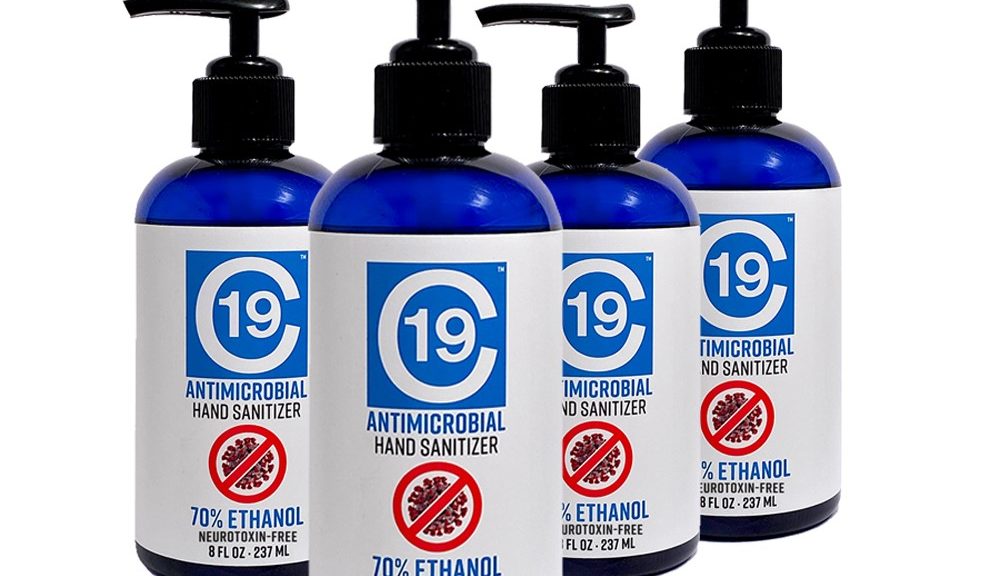
C19 Antimicrobial Hand Sanitizer Gel, neurotoxin-free, fragrance-free, 70% pure ethanol
Documentation of a non-adverse effect level for methanol is non-existent. -National Institute of Health
LOUISVILLE, Colo. (PRWEB)
July 07, 2020
On June 17th 2020, FDA issued a warning letter to ESKBiochem to cease marketing and recall their family of 9 hand sanitizer products because methanol, a highly neurotoxic poison, was detected despite labels indicating ethanol was being used as the active ingredient.
While it appears ESKBiochem was intentionally misleading consumers, methanol is still often present in hand sanitizer products because many are made with denatured alcohol, a common and cheap ingredient. Denatured alcohol is ethanol intentionally made poisonous so it cannot be used to produce alcoholic beverages, which are subject to a significant excise tax. Unfortunately for consumers, this denatured alcohol may contain a high concentration of methanol as there is no formal standard for ‘denatured’ alcohol.(3) The New York Times recently reported three deaths and one case of permanent blindness due to methanol poisoning from hand sanitizers(1). The safer option is to use 200 proof ethanol (100% pure, food grade) though it is a rarer and more costly ingredient.
Legally, if a company states “ethanol” or “ethyl alcohol” in the Drug Facts table, they are bound to use pure ethanol in the product. But the question is, are they? Presently no entity regularly polices label-stated content; FDA only does so when significant problems are suspected, as was the case with ESK where their CleanCare NoGerm tested at 28% methanol, despite label claims of using “Ethyl Alcohol” as the Drug Facts active ingredient.(2)
Since the Covid pandemic has caused massive demand and supply instability of hand sanitizer products, many companies and people who are not chemically sophisticated have entered the marketplace to access perceived easy profits. They often do not have the expertise to formulate or understanding to source the appropriate quality of ethanol for use in hand sanitizers. These inferior products may have offensive odors and irritate or dry out skin even until it cracks and bleeds. According to the National Institutes of Health, a 5% concentration of methanol in ethanol can cause “severe and fatal illness” and “documentation of a non-adverse effect level for methanol is non-existent.”(5) Absorption of methanol through the skin causes toxic effects similar to oral methanol exposure, according to FDA: nausea, vomiting, headache, blurred vision, permanent blindness, seizures, coma, permanent damage to nervous system or death.(2)
Consumers should choose products that only use 200 proof food grade ethanol. Industrial denatured alcohol is a very common solvent and fuel that can be easily misrepresented in hand sanitizers, especially by companies and individuals who are not skilled in the art of Over The Counter (OTC) drug product development.
Here are common poisonous ethanol denaturants that may not be on ingredient lists(3):
Methanol – often up to 50% in the US
Isopropyl alcohol
Acetone
Methyl ethyl ketone
Methyl isobutyl ketone
Pyridine
Hexane
The Covid pandemic compels institutions to provide hand sanitizer products and other PPE. FDA has made it clear that methanol exposure is a real problem in the product category and with the ESKBiochem notice is likely only scratching the surface of industrial malfeasance. Employers, service providers and schools are obligated to source non-toxic, effective products to protect the health and safety of their employees, customers and children. Such customers need to have confidence in the products they choose, and manufacturers must provide relevant information to generate this trust.
Kabana Skin Care created C19, a neurotoxin-free, fragrance-free, 70% ethanol by volume (using 200 proof, 100% pure, food grade ethanol) hand sanitizer, which exceeds the CDC recommendations, and leaves your hands feeling silky smooth. Kabana has been in business 15 years, producing personal care products such as mineral sunscreen with certified organic food grade ingredients that nourish and support human physiology instead of contaminating and degrading our bodies. Ingredient transparency is a key element of the Kabana strategy. The C19 product was launched on March 24th in response to the Covid crisis and our recognition of problematic consumer exposure to methanol and other neurotoxic chemicals through the vastly increased and required use of hand sanitizer for minimizing Covid-19 infection rates.
Erik Kreider MS MBA, Kabana’s founder and creator of its formulas, is a Stanford biochemist and pharmaceutical scientist who realized there are safer ways to nourish skin and protect health than the classic mass market approach that uses petrochemical ingredients with no biochemical utility in our bodies.
C19 Antimicrobial Hand Sanitizer is available at http://www.c19usa.com and http://www.kabanaskincare.com.
Sources:
1. https://www.nytimes.com/2020/06/26/us/3-dead-drinking-hand-sanitizer.html
2. https://www.fda.gov/drugs/drug-safety-and-availability/fda-advises-consumers-not-use-hand-sanitizer-products-manufactured-eskbiochem
3. https://en.wikipedia.org/wiki/Denatured_alcohol
4. https://www.cdc.gov/coronavirus/2019-ncov/hcp/hand-hygiene.html
5. https://pubmed.ncbi.nlm.nih.gov/11926610/#:~:text=Methanol%2C%20a%20potent%20toxicant%20in,severe%20and%20even%20fatal%20illness.
6. https://www.cnn.com/2020/06/22/us/hand-sanitizer-fda-trnd/index.html
7. https://www.usatoday.com/story/news/health/2020/06/23/9-hand-sanitizer-brands-may-contain-methanol-fda-warns/3239862001/
8. https://www.forbes.com/sites/brucelee/2020/06/22/fda-dont-use-these-9-hand-sanitizers-due-to-toxic-ingredient/#3325c0c45518
Share article on social media or email:

